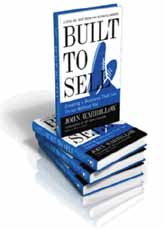Seller Beware

A daily selection of features, industry news, and analysis for AV/IT professionals. Sign up below.
You are now subscribed
Your newsletter sign-up was successful
There are those who believe that a business should be ready for sale at all times. Barry Evans is not one of them.
As partner at Acquisition Services Group, a business brokerage firm based in San Diego, CA, Evans argues that if a business is operated based on the objective of being sold at any point in time, it’s unlikely that it will succeed in meeting targets. “Your target should be doing what is best for your business with respect to future growth, profitability, stability, and risk reduction,” he said. Instead, business owners who are contemplating a sale should take the time—and that could be several years—to prepare their business for market.
In many cases sellers have unrealistic expectations associated with the value of their businesses.Part of this preparation involves determining how much your company is actually worth. Evans relays that in many cases sellers have unrealistic expectations associated with the value of their businesses—a natural and understandable phenomenon, since business owners are usually so closely linked with their organizations. But seller beware: By attaching an unrealistic asking price to your business, you risk wasting time, money… and never making a sale. This is where it’s necessary to enlist the services of a business valuation expert, preferably one that is familiar with the systems integration industry.
“As business owners we all have report cards, and it’s usually our profit and loss statement. That’s not a very good report card when it comes to being an entrepreneur,” said John Warrillow, founder of Sellability Score, a business sellability “scorecard” service, and author of Built to Sell: Creating a Business That Can Thrive Without You (Portfolio, 2011). While a profit-and-loss statement is necessary, so, too he underlines, is a valuation statement.
Each business is valued slightly differently, but most buyers share some common concerns: Is it profitable? Does it boast established earning power? And what are the risks? If, for example, a business is profitable, but 80 percent of its revenues are derived from one customer, it’s not a very attractive purchase. “If you have customer concentration issues, that’s kind of a deathblow because it is not ordained that existing customers will continue to exist in the future,” Evans said. The same, he added, applies to vendors.
Recurring revenue is also extremely valuable to buyers, and can drastically affect your price. Warrillow noted that with security companies specializing in installation work only, for example, acquirers will generally value install revenue at 75 cents on the dollar: If the business generated $1 million dollars in revenue, the offer would be $750,000. But if that security company derives revenue from monthly monitoring contracts, the price goes up dramatically: suddenly, the acquirer will pay $2 for every $1 of that recurring revenue. And suddenly, the price goes up to $2 million.
Evans explained that the due diligence process should be as detailed as possible, creating what he terms a “litigation defense wall”. “What we want to do is disclose, in writing, every aspect of the business,” he said. This prevents buyers from coming back to you after the sale, claiming that you did not make them aware of certain problems within the business. “If you put it in writing as part of the documentation process, and have all of the due diligence materials and exhibit them as legal documents, the only way you get in trouble is to have lied in writing.” In which case, he only half-jokes, you deserve to be sued.
A daily selection of the top stories for AV integrators, resellers and consultants. Sign up below.
Lying—or hiding—any issues that exist in your business is, in fact, one of the biggest mistakes that sellers can make, according to Evans. “The truth tends to surface after a period of time, and it invariably involves litigation,” he said. And litigation is extremely expensive, whether you win or lose. “You are infinitely better off, if you’ve got a problem in your business, to accept that reality as an adjustment to the price rather than trying to get a higher price and think that you can hide it. The litigation costs, the aggravation, and the wasted time will cost you 10 times as much and simply isn’t worth it.”
One of the trickiest aspects of selling a business is keeping the fact that it’s for sale a secret. Confidentiality, however, is paramount if you wish to maintain strong relationships with your lenders, vendors, customers, and especially employees. According to Warrillow, a few top managers may need to know about the sale ahead of time. “Those people are the ones that you need to bring into the fold, and explain to them the process that you are going through,” he explained. “As you bring those people in, you ask each of them to sign a confidentiality agreement so that they keep the news confidential.” You may also give them an incentive that is associated with the sale of the business. The rest of the staff, however, should not be aware of it until the business is actually sold.
Warrillow has sold four businesses so far, and happily recounts that he has not experienced seller’s remorse. He attributes this to having made plans, before the sale, for what he was going to do after exiting each company. However, he acknowledges that while some sellers feel remorseful post-sale because they feel they have lost their identity, others have regrets about how they handled the sale. “Oftentimes, entrepreneurs get seller’s remorse when they negotiate with only one buyer,” he said. “They don’t hire an intermediary that creates a market for the business, and they don’t seek other bids from other companies.” Six months later they wake up and begin questioning whether or not they got a fair price—and they will never really know the answer.
This, again, is why it’s necessary to enlist the services of the right experts. “I would not recommend that anyone sell their business without an intermediary, such as an investment banker or business broker,” Warrillow said. “It’s really the investment banker’s job to create a competitive edge, and to find an appropriate buyer, to make sure they are legitimate and to make sure that they are well-financed.” After all, you wouldn’t sell your house without hiring a real estate agent, and your house is probably worth a fraction of your business. “It’s not a do-it-yourself kind of thing.”
Carolyn Heinze is a freelance writer/editor.
What is the most important factor that makes a company ready for sale?
Lorne Bjorgan, CTS President, Design Electronics
- * Strong, accurate financial information.
- * A client list with many long-term, happy customers on it.
- * A company that can operate efficiently without the current owner.
- * A competent management group, each in charge of their own area, while functioning as a group, all with the same goals and vision.
Andrew M. Musci President/CEO, Altel Systems
* The best deals appear to be done when the existing business can stand on its own and create a reasonable ROI for the new owner without the founder or current owner at the wheel. This works well for both parties as it enables the current owner to head off into the sunset, which is most likely his/her goal and it enables the new owner to take control of a self-sustaining business that is not wholly reliant on one or two key people to survive.
Jeff Stoebner President and CEO, AVI Systems
* Having a realistic understanding of the value of their business.
Mark Vitt New England Executive Director, Verrex
* If Verrex were looking to acquire a company, our strategy would be to filter based on a company’s innovative approach to service delivery, office location or regional knowledge, key employees, and undervalued assets. Generally we see companies that may have one or two of these attributes, but not all.
Brock McGinnis Systems Division Sales Manager, Westbury National Show Systems
* The real key is the owner actually having a compelling reason to sell. Whether the motivation is retirement, illness, working capital pressures, the strong desire to be part of a larger organization with better upside potential, or simply fatigue, if the seller doesn’t really want out the price will never be reasonable (to the buyer) and the deal will never happen.
When It’s All About You

Because of the nature of the systems integration industry, AV firms are most often associated with their owners. While this serves to establish strong bonds with clients, manufacturers, and other partners, it can be a detriment when you put your business up for sale.
John Warrillow, founder of Sellability Score and author of Built to Sell: Creating a Business That Can Thrive Without You, says that the best way to get around this is by branding your process. “If people don’t brand their process of how they do installation work or service work, then the client’s only default option is to associate the company with the person that they know there,” he said. “My suggestion would be to have the Eight-Step AV Installation Process, or the Nine- Step Automation System Installation Process—whatever—where you are branding a process, not a person.”
—C.H.
Carolyn Heinze has covered everything from AV/IT and business to cowboys and cowgirls ... and the horses they love. She was the Paris contributing editor for the pan-European site Running in Heels, providing news and views on fashion, culture, and the arts for her column, “France in Your Pants.” She has also contributed critiques of foreign cinema and French politics for the politico-literary site, The New Vulgate.
